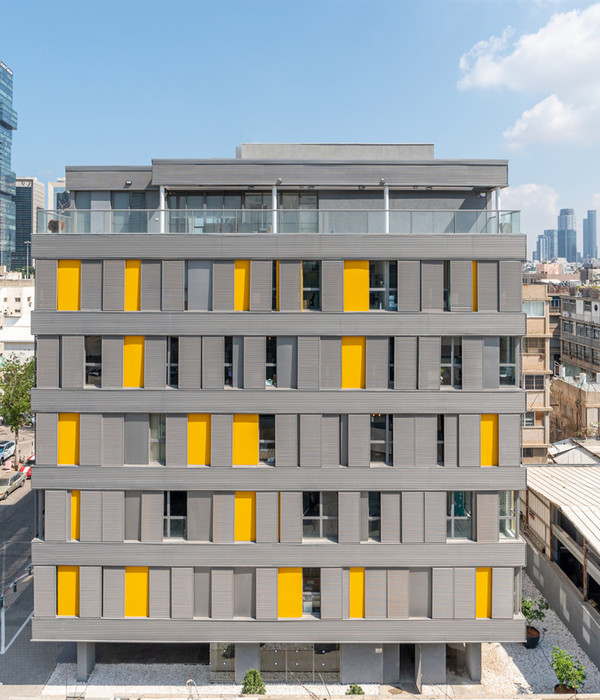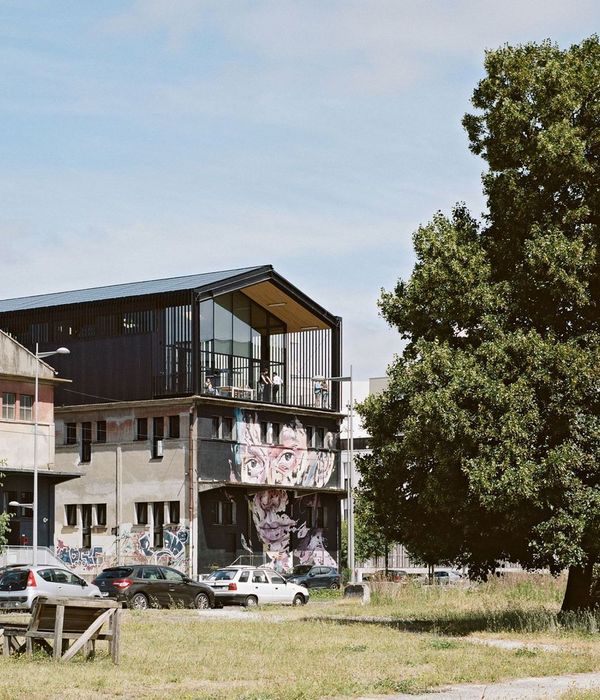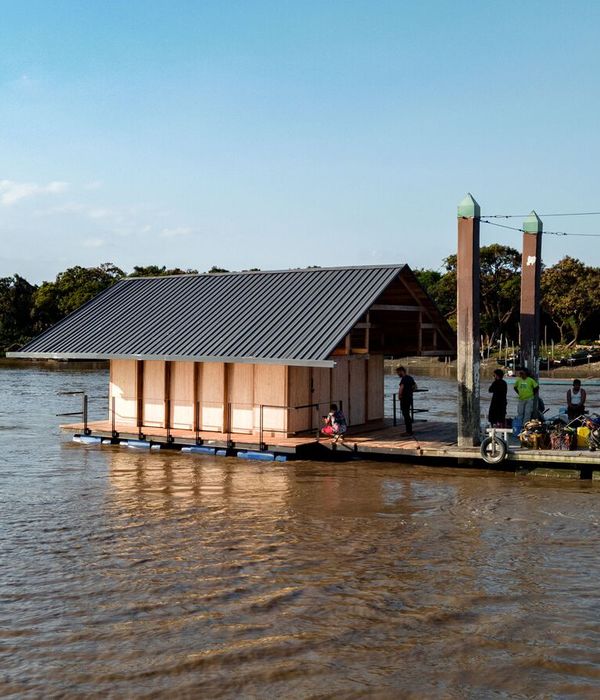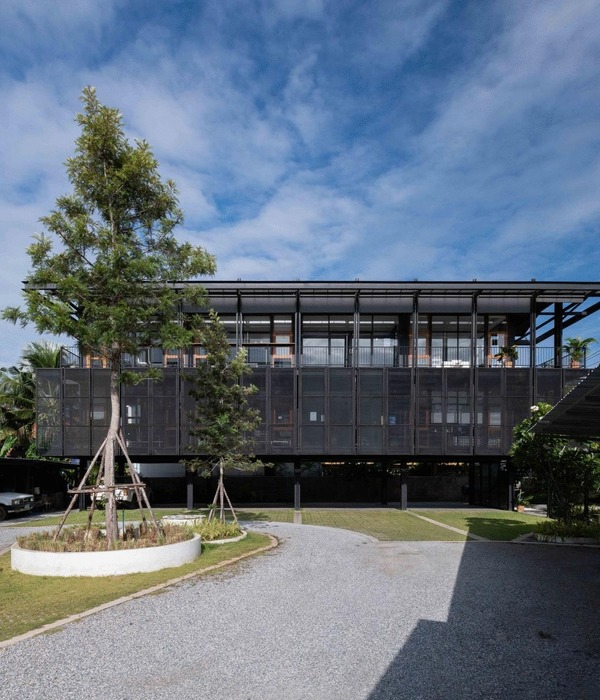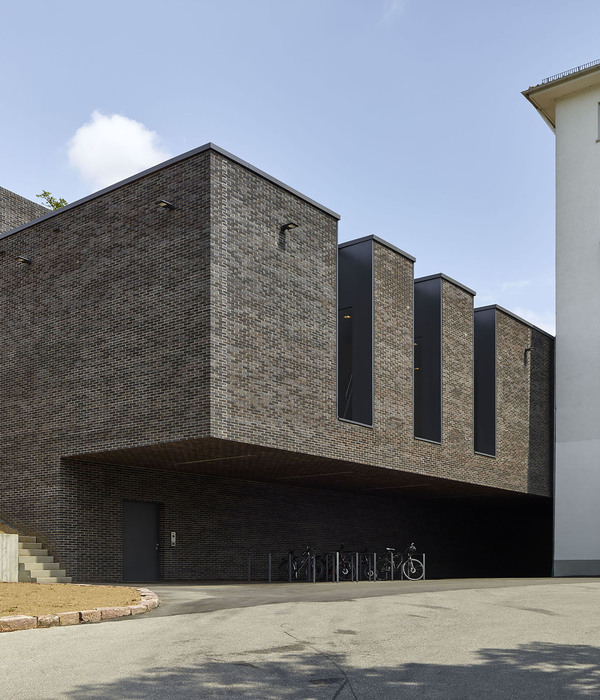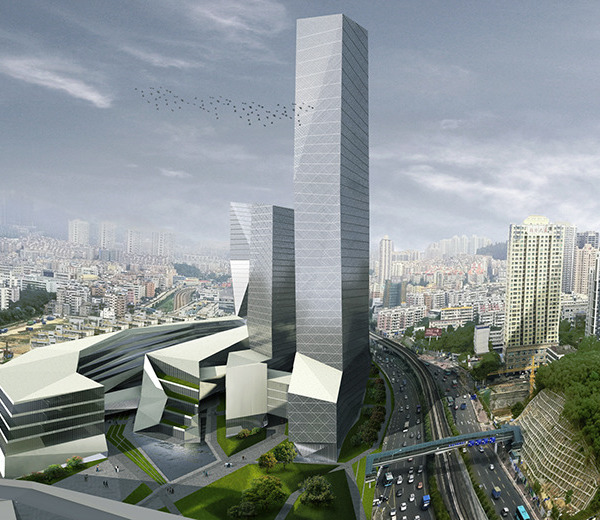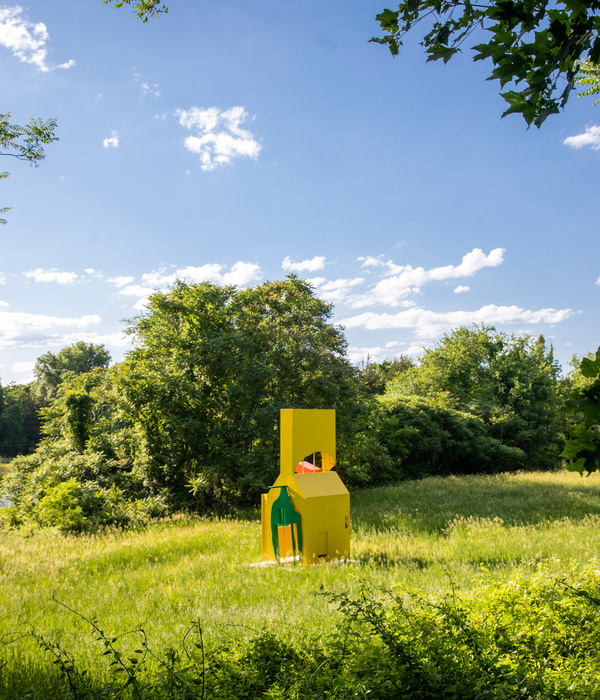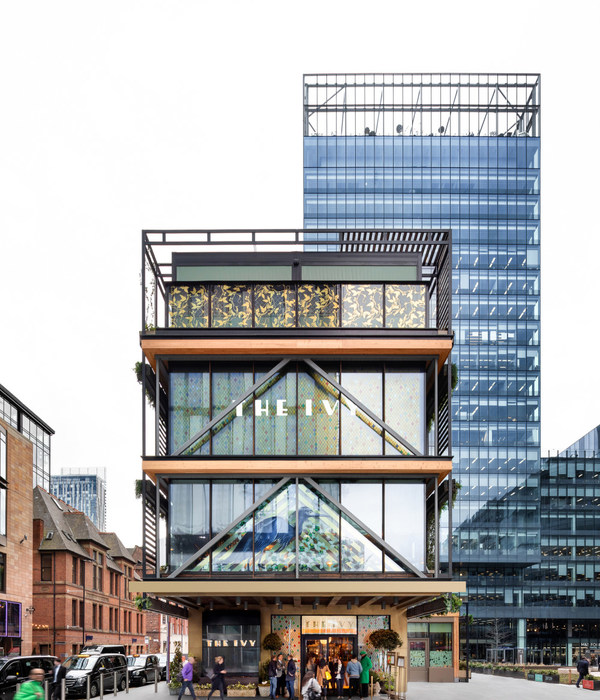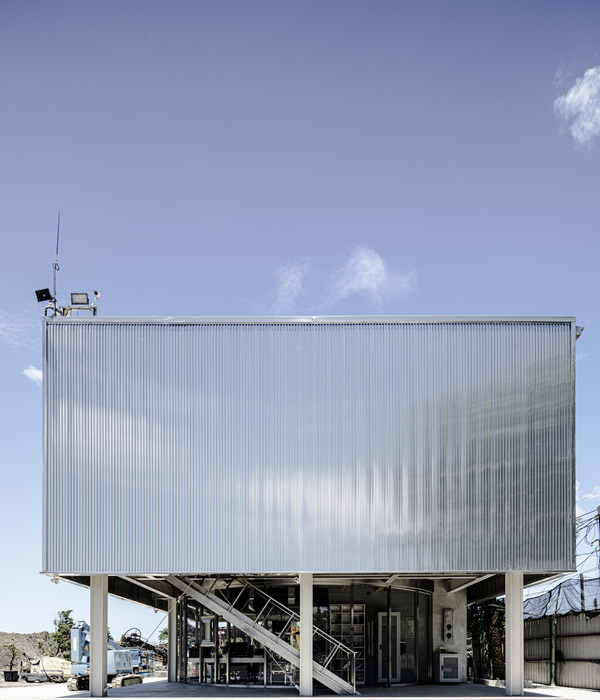《柱阵》是为2021年唐山德龙钢铁雕塑艺术园而创作的一组作品。德龙钢铁艺术园整体地势平坦开阔,由于紧邻渤海,原是湿地滩涂,土壤特性不利于高大乔木生长,但园区内有多处水域,水草丰茂,利于鸟类栖息,因而也被划分为湿地鸟类保护区。园区北边紧邻钢铁生产区,各类工业设施林立,蔚为壮观。东西向开阔深远,天地交接之际是成片的防护林。
Column Matrix is a work created for the exhibition at 2021 Delong Steel Sculpture Art Festival in Tangshan.The site, Delong Steel Art Park, is expansive and flat. Close to Bohai Sea, it was originally a tidal-flat wetland, with soil conditions not conducive to the growth of trees. However, there are several water areas within the park, which provide favorable water and grass resources for birds to inhabit, hence becoming a wetland bird reserve. Meanwhile, the park forms a strong contrast with the tall, spectacular industrial facilities in the steel production zone to its north side. Its east and west sections are long yet expansive, connecting with protection forests.
▼《柱阵》与环境,Column Matrix and surroundings©金伟琦
园区朝南本是一马平川,视线可直抵海天交接,但遗憾的是,在园区与大海之间横亘了一片新开发的商业楼盘,塔楼林立延绵不绝,仿若一面巨大的屏风立于天地间。虽然园区区域面积很大,但是由于地势平坦,这片楼盘仿佛近在咫尺,不仅破坏了原本纯净舒展的天际线,还对园区造成不可回避的视觉压迫感。
The south zone of the park originally provided a direct view to the sea, which is interrupted by a new property development composed of rows of tower buildings. The park is expansive yet has a flat terrain, so the property development appears like a large screen right in front of it, which controls the skyline and poses an oppressive feeling to the park.
▼作品位置,Location ©场域营造工作室
创作的初衷是想在艺术园区制造一个“地标”,以此来“抗衡”和“缓解”商业楼盘所带来的尺度压迫和视觉突兀。如果这一目的不能真正实现,至少也能在南向的空间观感上实现某种空间递进关系以增强景深。这一想法决定了作品的体量应该尽量向竖向发展,不仅如此还得呈现出组团感,只有这样才能保证既有高度又有体量。以上就是作品《柱阵》空间生成的基本逻辑。
The design intention of this work was to create a “landmark” in the park, to counter and mitigate the oppressive feeling and visual abruptness of the large property development, or at least to create a visually progressive spatial relationship in the park’s south zone to strengthen its visual depth. To that end, the volumes of the work need to extend upwards and meanwhile form a cluster, to ensure both height and spatial volume. This is the logic behind this design work.
概览,General view©金伟琦
创作的计划是在艺术园区靠南的区域内寻找一处地势相对高起的场地,设置一组有垂拔感的方形柱阵,形成艺术园区域内的制高点,以与远处高耸的楼盘形成对应。方形柱阵由9组单个空心柱体构成,每个空心柱体采用高7.2米、宽2.2米、厚0.02米的钢板焊接围合而成,柱体与柱体之间的间距为1.5米。9组这一数量的采用和1.5米间距的确定是模型推演的结果,因为只有这样才能获得较强的团块感。在作品的实际实施过程中,为节省造价,原定的单柱高度由7.2米缩减至6米。这无疑严重影响了柱阵的整体高度,不过令人宽慰的是,高度的缩减对其整体的体量影响尚可接受,因为庞大的空间气场仍在!
▼作品演变,Diagram ©场域营造工作室
The original plan was to find a relatively higher area within the south zone of the art park, and to set a matrix of erecting columns to create the highest point in the park, so as to confront the tower buildings of the property development in the distance.
The square matrix consists of 9 hollow columns, each of which is enclosed by steel panels that were planned to be 7.2m, 2.2m and 0.02m in length, width and thickness. And the distance in between columns was set at 1.5m.
The number of columns and the distance between columns were determined based on a deduction process through models, for the purpose of achieving a strong sense of clustered blocks. However, during construction, the height of each column was reduced from 7.2m to 6m for the sake of saving cost.
This inevitably lowered the overall height of the matrix of columns, but luckily its impact on the overall massing was acceptable as it didn’t affect the magnificent spatial atmosphere.
▼外观,External view©金伟琦
有垂拔感的方形柱阵,Matrix of erecting columns ©金伟琦
公共艺术作品必须有“表情”、必须“说话”、必须传递“信息”,这些“表情”引发人的情绪、这些“话语”产生沟通、这些“信息”调动人的日常经验与情感。因为,作品与场地的关系重要,作品自身的空间形态也重要,但是,作品与人的沟通交流以及以此引发的人的互动参与更重要。当然,需要指出的是,在实际的创作思考中,这三者互为一体,相互交织,密不可分,并不是先解决了什么,再解决什么,最后再解决什么的线性发展关系。
According to the design team, a public art work needs to be given “expressions”, and has to “tell” and convey messages. Its expressions and narratives need to evoke interaction, and the messages it conveys have to resonate with people’s daily experience and emotions. The relationship between the work and the site is important, and the spatial form of the work itself is also essential, but what matters most is the interaction between the work and people. In public art work creation, those three aspects are intertwined, and hence need to be considered in a holistic way.
▼内部视角,Internal view©金伟琦
▼作品与人的互动,Interaction between the work and people ©金伟琦
为给《柱阵》赋予“表情”,让钢板“说话”,让作品传递“信息”,我的关注点再次回到材料。钢板这一材料是中性的,其实任何材料都是中性的,如何运用?传递什么信息?因使用者的观念和需要而异。钢铁无疑是现代工业文明的重要标志之一,而钢板给人的惯常感觉更是冷峻、坚实、厚重。为使作品呈现出一定的日常性和亲和感,我希望赋予钢板某种温暖、通透、轻盈的气质。为实现这一效果,我将原本厚重密实的钢板置换成爬山虎的藤蔓肌理,以此作为围合空间的语言和手段。对钢板加工制作的方式是先激光镂刻再焊接围合。不得不说,乍一看,这一置换手段稍显突然;爬山虎的藤蔓肌理出现在这样的空间场域也会有突兀之嫌。之所以会采用爬山虎的藤蔓肌理作为表现语言,并不是要利用这种语言的装饰性,而是捕捉到爬山虎的藤蔓肌理承载和暗示空间实体的可能。
To endow this work with “expressions”, and to enable it to “tell” and convey messages, the chief designer Hu Quanchun put emphasis on materials. He thought about how to utilize steel panels and what messages to be conveyed through this neutral material, which to a large extent depends on users’ notions and needs. Steel is undoubtedly a symbol of modern industrial civilization, but steel panels often give people an impression of coolness, solidness and heaviness. To let the work present a sense of dailiness and affinity, he decided to give the steel panels a warm, transparent and lightweight feel. To that end, Hu Quanchun converted solid steel panels into the textures of creeper vines to enclose the column space. To realize that effect, steel panels were treated through a process of laser carving and welding. At first glance, the vines-like pattern may seem to be slightly abrupt on the site. However, in fact its true intention is not for decoration, but to imply the existence of a possible spatial entity.
▼钢板呈现出温暖、通透、轻盈的气质,The steel panels present a warm, transparent and lightweight feel ©金伟琦
▼爬山虎的藤蔓肌理,Vines-like pattern ©金伟琦
这一手法在我个人以往的创作中有过研究。爬山虎依附建筑实体自然生长的场景随处可见,当我们将建筑实体抽离时,其生长状态依然保有原来建筑的空间形态,这种空间的记忆感、模糊性以及由此带来的废墟气质是我的兴趣所在。作品《柱阵》所要表现的是爬山虎依柱体肆意生长的状态,我只不过是将原本密实厚重的柱体“抽离”了而已,留下的是由爬山虎藤蔓肌理勾勒出的有关柱体的空间记忆。
The concept about creeper vines was explored in Hu Quanchun’s previous design works. The scene that creepers sprawl on architecture is very frequently seen in daily life. When detaching the architectural body, the growing status of the creepers can still reflect the form of the former architectural space. Such memory and ambiguity that creeper carries and the imagery of ruins that it evokes are what Hu Quanchun is interested in. This work expresses the status of creepers growing freely on columns. The designer “detached” the dense, solid columns, and left creeper vines’ textures to outline the silhouette of the original column space and carry its memory.
▼爬山虎依柱体肆意生长的状态©金伟琦
Status of creepers growing freely on columns
激光镂刻的处理手法赋予了钢板一定程度的透明性。藤蔓肌理的转折围合和相互重叠营造出丰富的空间层次。为加强人在作品中的空间体验,每个网状柱体还设置了不同开洞方式,以营造出丰富的动线和视线。当人进入作品,完全沉浸在作品所营造的光影斑驳的场域之中。如果远观《柱阵》,其密集又虚幻的状态成为整个场域中特别的存在,而且在不同的角度和方位所呈现的面貌是不一样的,带给观者的感觉是作品不断在变化。
The laser carving process enhanced the transparency of steel panels. The twists, turns and joints of “vines” produce rich spatial layers. To enrich visitors’ experience in the column space, each mesh-like column is set with different openings to create diversified circulation routes and sight lines. When entering the column space, visitors will be immersed into a spatial realm awash with light and shadows. While taking a look at it from a distance, it stands out on the site with its dense volumes that blur the real and the virtual. It presents different visual effects when viewing from different directions or angles, bringing visitors varied experiences.
▼钢板细部,Details©金伟琦
至于爬山虎藤蔓纹理和符号的突然引入会带来突兀感这一顾虑是否真的存在?这片滩涂湿地由于土壤含盐成分太高,本不利高大植物的生长,而作品《柱阵》最终营造出的虚幻重叠和藤蔓密集肆意生长意向在场地中营造出强烈的超现实感。《柱阵》空间围合的藤蔓肌理与土地产生有效关联。
Are the textures and symbols of creeper vines introduced to the site really abrupt? As the tidal-flat wetland is not conducive to the growth of trees due to its saline soil, the introduction of the matrix of columns creates a strong, surreal scene of vines freely growing upwards, which blurs the real and the virtual. Therefore, the vine patterns which enclose column space are actually a response and echo to the site.
▼黄昏下的《柱阵》,Column Matrix at dusk©金伟琦
▼远观,Distant view©金伟琦
▼平面图,Plan
©场域营造工作室
▼立面图,Elevation
©场域营造工作室
作品名称:《柱阵》创作机构:场域营造工作室工作室网站:作品创作:胡泉纯
创作团队:向昱、陈松林、原航、鲁博文、郭纯志、钟承志、白雨萌
出品人:丁泽华
学术指导:隋建国
策展人:唐尧
展览策划:李克非
展览统筹:张禹
项目地点:唐山乐亭德龙钢铁厂
委托方:唐山乐亭德龙钢铁厂
作品尺寸:9.6米×9.6米×6米
项目材料:耐候钢
创作时间:2021年4月
建成时间:2021年6月
项目摄影:金伟琦
Work name: Column Matrix
Design firm: Field Conforming Studio
Email:Chief designer: Hu Quanchun
Design team: Xiang Yu, Chen Songlin, Yuan Hang, Lu Bowen, Guo Chunzhi, Zhong Chengzhi, Bai Yumeng
Commissioner: Ding Zehua
Academic instruction: Sui Jianguo
Exhibition curator: Tang Yao
Exhibition planning: Li Kefei
Exhibition coordination: Zhang Yu
Location: Delong Steel Art Park, Leting, Tangshan
Entrusting Party: Delong Steel
Size: 9.6m×9.6m×6m
Material: weathering steel
Start time: April 2021
Completion time: June 2021
Photography: Jin Weiqi
{{item.text_origin}}

